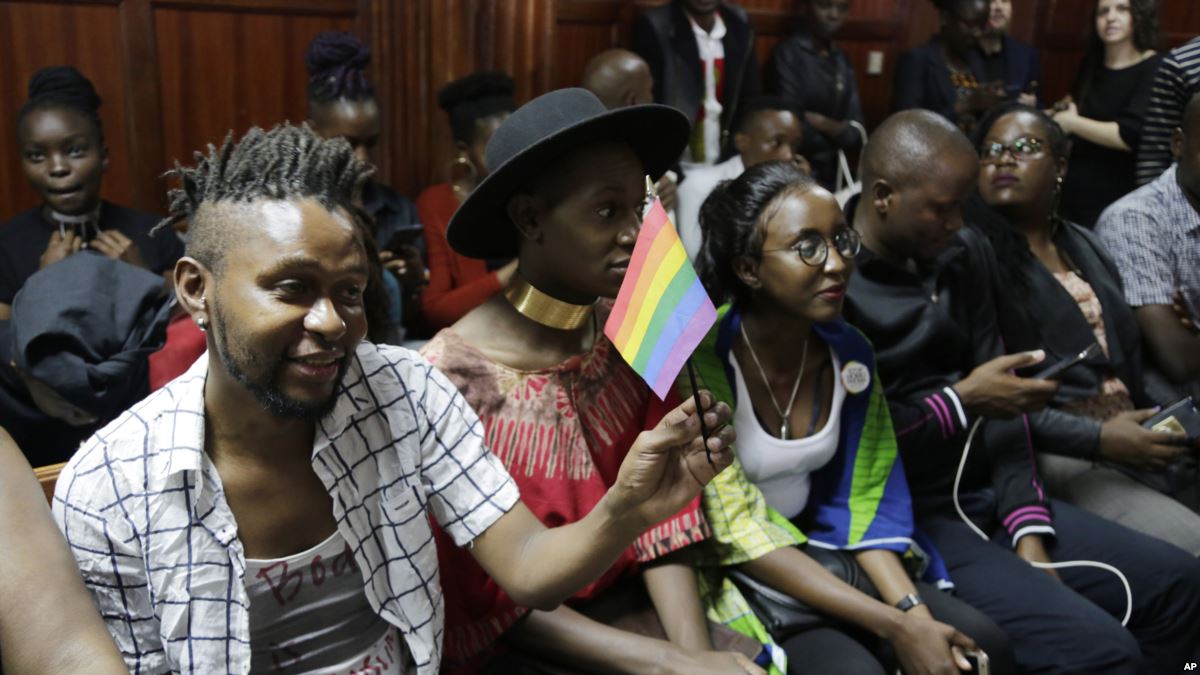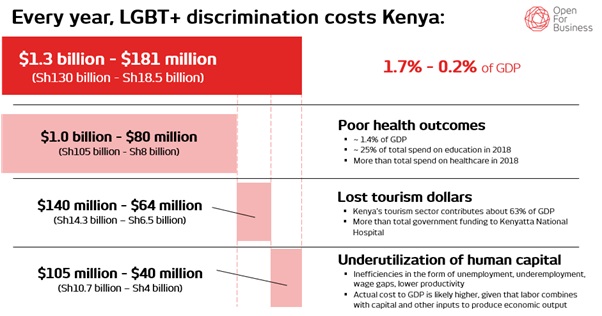
Kenya’s LGBT Discrimination Costs Economy $1.3 Billion, 1.7% of GDP
Kenya’s progressive new constitution, ensures all Kenyans the rights to privacy, equality, dignity, and non-discrimination. It articulates a set of national values that include “human rights, non-discrimination and protection of the marginalized.” This hasn’t translated into safety against violence, an end to state sponsored homophobia, and equality in the workplace for LGBT Kenyans. The situation is far from it.
Human Rights Watch continues to report state sponsored homophobia in Kenya, including violence against LGBT. Groups of LGBT people attacked in incidents of mob violence and continually threatened. Rhetoric vilifying LGBT people, much of it by religious leaders shapes public perceptions.
This has impact beyond the LGBT community. A culture of anti-gay discrimination is costing Kenya $1.3 billion per year, as outlined by Clinton Global Initiative born Open for Business consortium, attributing the losses to missed tourism earnings, poor health and less employment of LGBT+ people, significantly stunting the economy over-all. The group is a response to the growing backlash against LGBT+ inclusion in many parts of the world. This is a wakeup call to policy makers in Kenya and other countries scoring low on equality for all citizens. Kenya’s GDP per capita is $1,507 USD, while India is $1,939 and Ethiopia further behind at $767 USD, also a country facing discrimination against LGBT.
The research and fact based evidence, lead by an alliance of businesses concerned with economic growth, from Deutsche Bank, to Microsoft and Google; measures the costs to the Kenya economy at a whopping 1.7% of GDP. This report rests on economic data rather than looking at all elements of discrimination and persecution faced by LGBT people. It concludes, LGBT inclusion is not just good for the LGBT community but for for the greater economy of the nation.
The origin of the losses is based on British colonial influences still oppressing Kenyans today. Colonial-era laws in Kenya criminalize gay sex with up to 14 years in jail and further prop up conservative religious sentiments. Kenyan LGBT face challenges getting jobs, housing, medical care, and education. The findings support civil society and government working to change negative attitudes toward LGBT. A high court case in Kenya is set to rule on the gay criminalization on May 24.
Tourism is an ever competitive sector. Countries and regional promotion boards are often competing to win the same markets. The World Bank reported in Standing out from the herd : an economic assessment of tourism in Kenya, “in recent years, the prospects of Kenya’s tourism industry have been clouded by a perfect storm of misfortunes – insecurity, growing global competition, and unsustainable tourism development.” A wide body of evidence shows that tourism is vital for emerging markets, who benefit from the foreign exchange travelers bring and at the macro level is helpful for balance of payments especially in trade deficit heavy countries.
LGBT tourism is a highly sought after segment; countries from Japan, France, South Africa, all work at the national level to win over this group not just with healthy domestic policies that protect and equalize LGBT but also by marketing to them. Thirty ministers of tourism for Europe and the ETC, knowing the importance of the LGBT travel market, built a handbook on understanding and winning LGBT tourism. In fact, similarly with a global agenda, the United Nations World Tourism Organization produces this report discussing the importance of LGBT on the entire tourism market. The Open-for-Business report estimated Kenya’s tourism industry is losing $140 million per year in foreign earnings because LGBT tourists were opting not to visit due to homophobic views.

Open for Business Report on LGBT Discrimination and Kenyan Economy
“HIV services are often out of reach for transgender women and gay and bisexual men due to anti-LGBT+ violence, thus they are nearly always disproportionately represented among those not receiving antiretroviral treatment, nor are they and their partners benefiting from treatment as prevention, “ the Report says. A lack access to medical services due to discrimination against LGBT+ people meant the poor health of sexual minorities was leading to lost productive working time”. Kenya’s HIV burden is large and discrimination of LGBT will prevent the country from reaching the “Getting to Zero” goals and means never ending the HIV health and human rights burden with huge economic drain and health risks impacting all of Kenyan society.
The lack of LGBT+ people in the job market as well lower wages faced by members of community due to discrimination costs Kenya over $100 million every year.
The study’s findings supported research done in other countries which showed that open, inclusive and diverse societies improve prospects for growth – while discrimination can cause long-term economic damage.
This isn’t the first study to show the costs of homophobia. For example, discrimination in Kenya in 2014, was measured by the Williams Institute in collaboration with the US government. The study was able to show that one additional legal right in the LGBT spectrum is associated with approximately a $320 in per capita GDP, or ‘about 3 percent of the average in the sample countries, and a higher human development index value. For instance, Kenya has a score of zero, as it does not provide any legal protections for LGBT people and has a per capita income of $1,318. In contrast, Argentina has a score of seven and a per capita income of $13,323, at the time of the comparison.’
Among the country in general, considering the goals of non-LGBT people, heterosexual Kenyans list their top concerns for their country as government corruption and economic opportunities, measured by Pew, which suggest working together to bridge the gap toward equality can benefit all.
Several major businesses in Kenya, are pleased to help lead LGBT equality in the workplace as well as encourage the government to end LGBT criminalization. ‘As key players and stakeholders in civil society, businesses have the means to influence the debate on lesbian, gay, bisexual and transgender (LGBT) rights at home and abroad. More directly, many multinational corporations have direct access to governments and politicians in countries where homosexuality is a crime and where the lives of LGBT people are severely restricted. These businesses have possessed the means to influence for many years; some have used it to great effect. Today, given the groundswell of support for LGBT rights in developed markets, there exists a business case for more companies to apply strategically their influence on the issue of criminalisation, The Human Rights Trust reports in Criminalising Homosexuality and International Business: the Economic and Business Cases for Decriminalisation.
You can read reporting on the pink economy and the financial success of countries:
- Advancing LGBT is Key to Canada’ Economic Growth, says Government
- Corporations in Mexico Supporting LGBT in the Workplace Double
- After Court Ruling Decriminalizing Homosexuality, Pink Dollar Set to Boost India’s Economy
- Japan’s Pink Economy Set to Boom
The LGBT Foundation is a not-for-profit organization with the mission to create the LGBT Token cryptocurrency and utilize blockchain technology to achieve equal rights and acceptance for all members of the LGBT+ community worldwide.